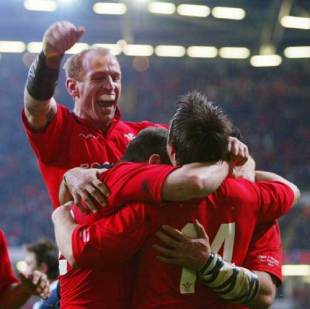|
2004 Six Nations
At last Wales have got it right
Huw Richards
March 11, 2004

Wales will hope Mike Ruddock gives them more to cheer after his appointment
© Getty Images
Enlarge
It is unclear by precisely what route the Welsh Rugby Union arrived at the surprise appointment of Mike Ruddock as national team coach. There will inevitably be speculation about the process by which Ruddock, a declared non-runner when nominations closed on 16th January, got the job and popular favourite Gareth Jenkins did not. But for once in a while the WRU has made the right choice. This is not to criticise Jenkins, whose achievements with Llanelli made him a highly plausible candidate for the job. The WRU could have appointed him, won popular plaudits, and also been entirely confident that it had somebody who was up to the job. But Ruddock's credentials take some beating - and not just because he should really have had the job in 1998 when he was offered it, only to see the offer rescinded when preferred candidate Graham Henry turned out to be available after all. His credentials from the Welsh game are pretty formidable. He coached one of the best Welsh club sides of the last 15 years, the Swansea team who won every domestic trophy and beat the World Champion Australians in the late 1980s and early 1990s. Those achievements have been underlined by success with Ebbw Vale, Wales A - and we can be sure that he will campaign for the reinstatement of the A team as an essential element in building international careers - and this season with Gwent Dragons. Widely expected to be making up the numbers among the five new provinces, the Dragons have instead been highly competitive. Still more significant, and his main edge over the admirable Jenkins, is the success he enjoyed as coach of Leinster. He showed that he could operate outside Wales - and his appointment, following that of Matt Williams to coach Scotland, means that three of the Six Nations head coaches have worked in the Irish provincial system. It also helps that his particular coaching expertise is with forwards - the area where, the Six Nations defeats against Ireland and France showed, Wales has greatest need of improvement. He is not, and would not claim to be, a miracle worker. He will have to work within the limitations of the current crop of players, a cash-strapped and none-too-competent employer, the continuing structural weaknesses of the Welsh game and its divisive regional politics. He can be sure that every playing setback will be greeted by claims - not so much a Greek as a Turk chorus - proclaiming that all would have been well had Jenkins been appointed, although his West Walian roots and links (he still lives in Swansea) should stop this being too much an east-west issue. And, while anything but a heedless romantic, he is a strong believer that Wales need to play to their traditional strengths of instinct, improvisation and deception as well as stiffening their forward effort. That so committed a supporter of the traditional Welsh style as Robert Jones, who knew him as both team-mate and coach at Swansea, is a committed admirer is highly reassuring. It can't be said often enough - not least because we haven't been able to say it nearly often enough over the past two decades - but the Welsh Rugby Union have got it right this time. © ESPN Sports Media Ltd.
|
Live Sports
Communication error please reload the page.
-
Football
-
Cricket
-
Rugby
-
- Days
- Hrs
- Mins
- Secs
F1 - Abu Dhabi GP
Abu Dhabi Grand Prix December 11-131. Max Verstappen ()
2. Valtteri Bottas (Mercedes)
3. Lewis Hamilton (Mercedes)
4. Alexander Albon ()
5. Lando Norris ()
6. Carlos Sainz Jr ()
-
ESPNOtherLive >>
Darts - Premier League
Golf - Houston Open
Snooker - China Open
Tennis - Miami Open

